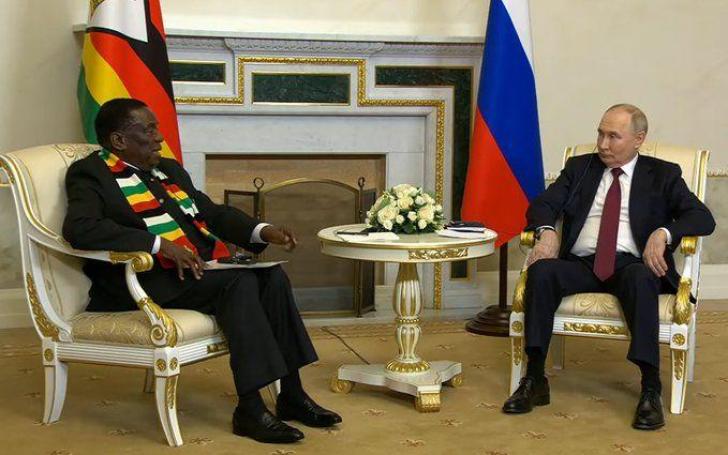News / Local
Mnangagwa bombshell explodes on his face
01 Jul 2024 at 03:28hrs |
0 Views

Zambia has called upon Sadc and the AU to intervene following President Mnangagwa's controversial remarks accusing Zambia of destabilizing the region by collaborating with the United States on security matters. Mnangagwa's comments, made during a visit to Russia, strained relations between Zimbabwe and Zambia, prompting strong reactions from Zambia's newly-appointed Foreign Minister Mulambo Haimbe. Haimbe condemned Mnangagwa's remarks as an unwarranted attack on Zambia's sovereignty, urging regional bodies to decisively address the issue to preserve unity and mutual respect in regional cooperation.
Historically, Zimbabwe and Zambia enjoyed cordial relations, rooted in their shared history including support during Zimbabwe's liberation struggle. Zambia has also advocated for lifting Western sanctions on Zimbabwean leaders, underscoring their historical and diplomatic ties. However, recent tensions escalated amid discussions over the establishment of a US Africa Command (Africom) office in Lusaka, which some Zambian MPs and citizens fear could exacerbate regional instability despite Africom's mission to strengthen security cooperation.
Further complicating matters, Mnangagwa's dissatisfaction with Zambia's stance on Zimbabwe's 2023 elections intensified bilateral friction. Zambia, through its leadership in Sadc, rejected Mnangagwa's re-election citing electoral irregularities, prompting Mnangagwa to internationalize the dispute by involving Russia. This move was seen as leveraging geopolitical tensions between the US and Russia for political gain, raising concerns about Zimbabwe's broader regional diplomacy.
In response, the US Embassy in Harare refuted Mnangagwa's claims, affirming substantial bilateral aid to Zimbabwe for health, humanitarian, and development purposes. Efforts to alleviate Zimbabwe's challenges, including food insecurity exacerbated by drought, underscored US commitment despite diplomatic strains. Analysts criticized Mnangagwa's diplomatic approach, noting its potential to strain Zimbabwe's upcoming chairmanship of Sadc and further destabilize regional relations already marred by electoral disputes and differing geopolitical alignments.
Historically, Zimbabwe and Zambia enjoyed cordial relations, rooted in their shared history including support during Zimbabwe's liberation struggle. Zambia has also advocated for lifting Western sanctions on Zimbabwean leaders, underscoring their historical and diplomatic ties. However, recent tensions escalated amid discussions over the establishment of a US Africa Command (Africom) office in Lusaka, which some Zambian MPs and citizens fear could exacerbate regional instability despite Africom's mission to strengthen security cooperation.
Further complicating matters, Mnangagwa's dissatisfaction with Zambia's stance on Zimbabwe's 2023 elections intensified bilateral friction. Zambia, through its leadership in Sadc, rejected Mnangagwa's re-election citing electoral irregularities, prompting Mnangagwa to internationalize the dispute by involving Russia. This move was seen as leveraging geopolitical tensions between the US and Russia for political gain, raising concerns about Zimbabwe's broader regional diplomacy.
In response, the US Embassy in Harare refuted Mnangagwa's claims, affirming substantial bilateral aid to Zimbabwe for health, humanitarian, and development purposes. Efforts to alleviate Zimbabwe's challenges, including food insecurity exacerbated by drought, underscored US commitment despite diplomatic strains. Analysts criticized Mnangagwa's diplomatic approach, noting its potential to strain Zimbabwe's upcoming chairmanship of Sadc and further destabilize regional relations already marred by electoral disputes and differing geopolitical alignments.
Source - newshawks
Join the discussion
Loading comments…































